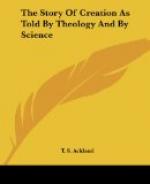But this feeling has disappeared, and now we are told that natural law is “the observed sequence of events.” In this case, then, the true meaning of the word is entirely lost—it is no longer possible to speak of law as the cause of any event.
But the old sense in which the word was applied to natural phenomena had in it far more of truth than the modern one. It was the imperfect expression of the great truth that God is a God of order—that there is a uniform procedure in His works, because in Him there is no change, no caprice. And it is of great importance to us that we should realize this truth, because we are dependent upon the laws of nature every moment of our lives. Every conscious act is performed under the conviction that the natural forces which that act calls forth will operate in a certain prescribed manner. But this conviction, though it restricts us to the limits of the possible, does not further impede the freedom of our will. To a certain extent we can choose what action we will perform, what forces we will call forth for that purpose, and what direction we will give them. Sometimes we can arrange our forces so that they will continue to act for a considerable time without any intervention from us; in other cases continued interference is necessary. But in all these cases there is no interruption of the law by which the working of these forces is regulated. We have then a limited control over these forces, and yet they are unchangeable in themselves, and in their mode of action.
When, however, we strive to ascend from our own works to those of God, we can no longer regard these forces as absolutely unchangeable. If they are practically so, it is because it is His Will that they should be so. It is this Will then which has its expression in the so-called laws of nature. The term now assumes a sense akin to, though not identical with, its original ethical sense. It is no longer a rule imposed by a superior on an inferior, but the rule by which the Supreme Being sees fit to order His own Work. While however we admit the possibility of law of this kind being changed, we have no reason to believe that in the universe with which we have to do any such change has ever taken place. But this does not preclude the possibility of Divine interference in the processes either of Creation or of Providence. New forces may from time to time be supplied, new directions may be given to existing forces, without any variation in the laws by which the action of those forces is regulated.
And if we believe that Creation was a progressive act, it is rather probable than otherwise that such interferences should take place. For a long period perhaps the uniformity of the work might lead us to forget the Being who was working; but times would arrive when definite stages of the work were accomplished, when higher developments of being were rendered possible, and in the introduction of those higher developments a something would be seen which could not be the result of the processes with which we had already become acquainted. Such interference would not in any way justify the supposition that the designs of the Author of Nature were changed, or that His original plan had proved defective. The more natural inference would be that they were a part of the plan from the first, but that the time for them was not then come.




